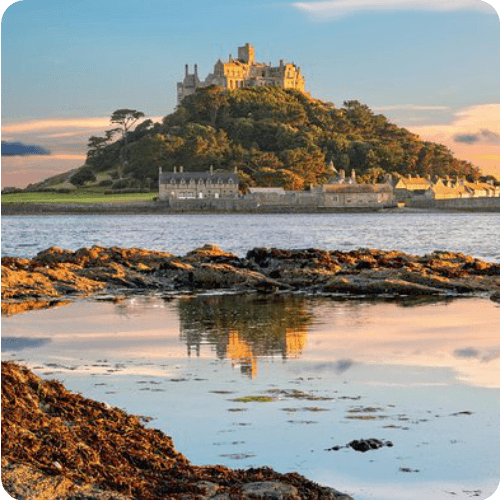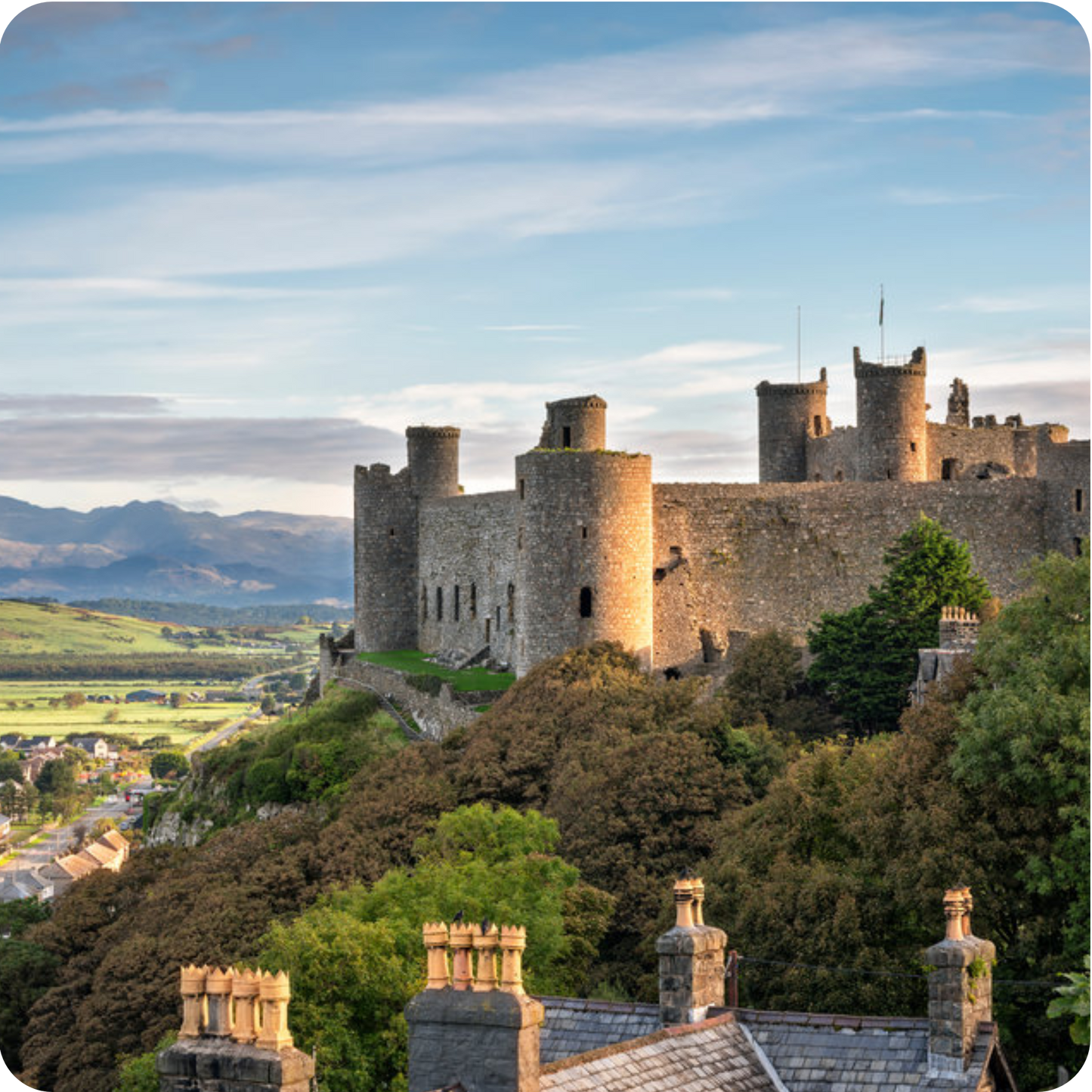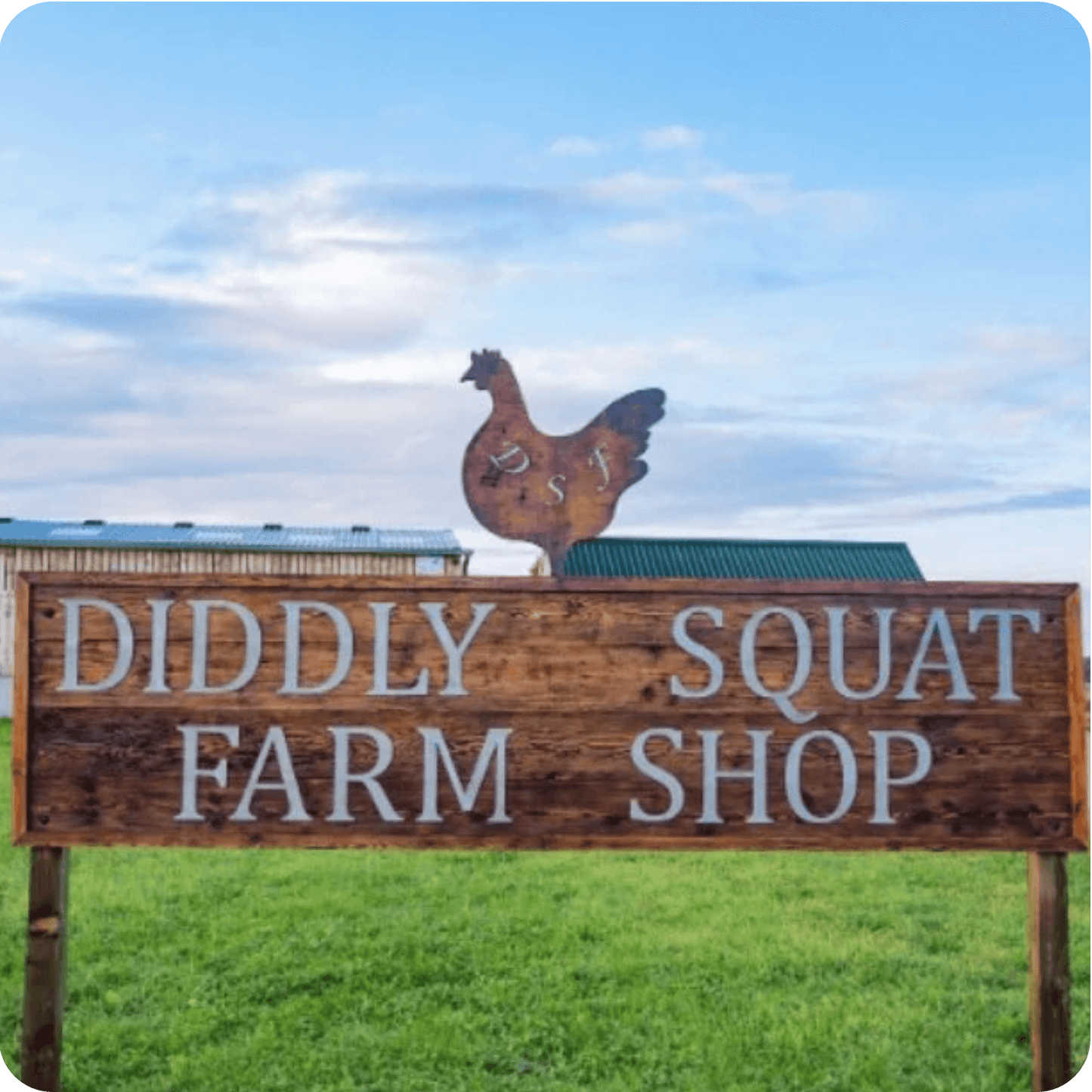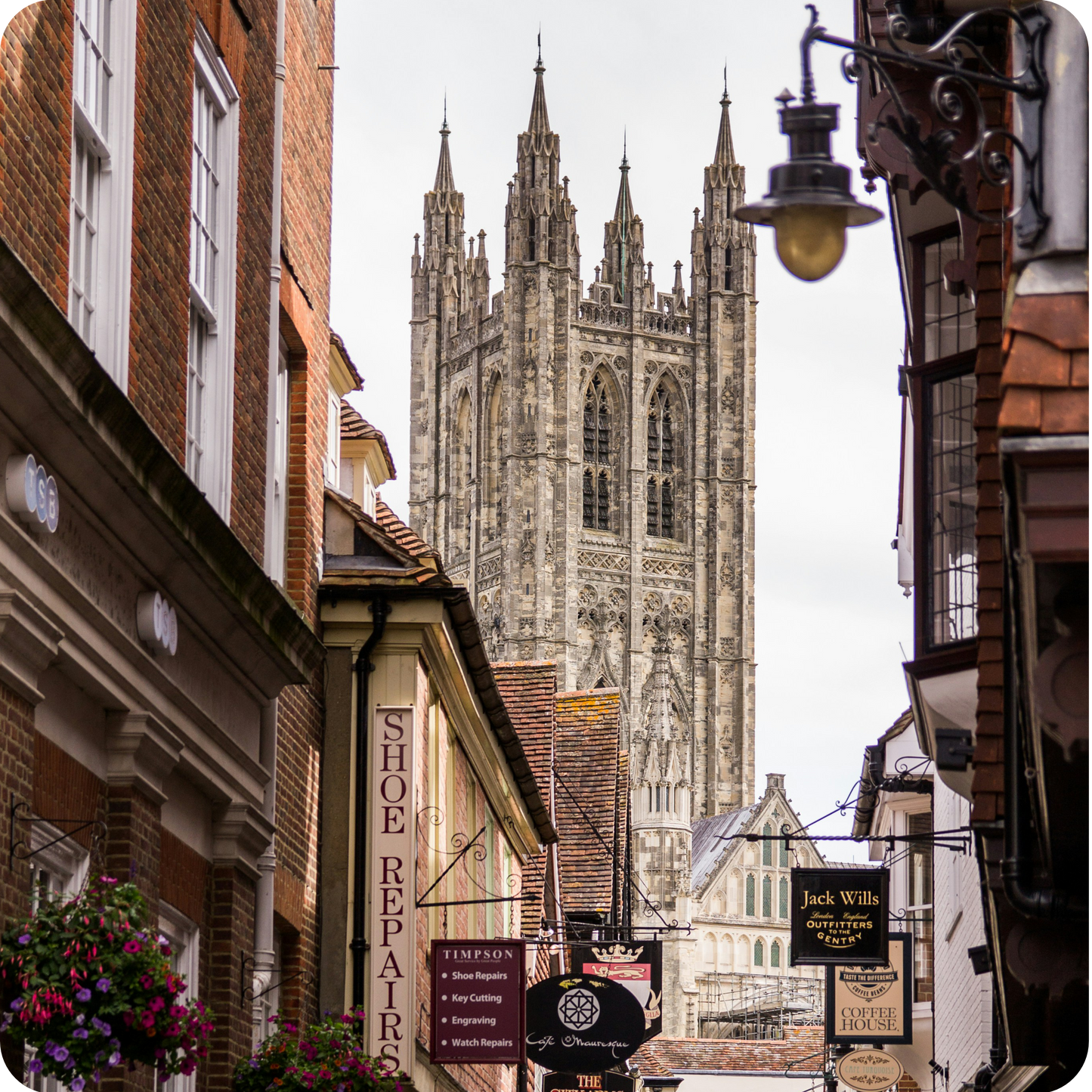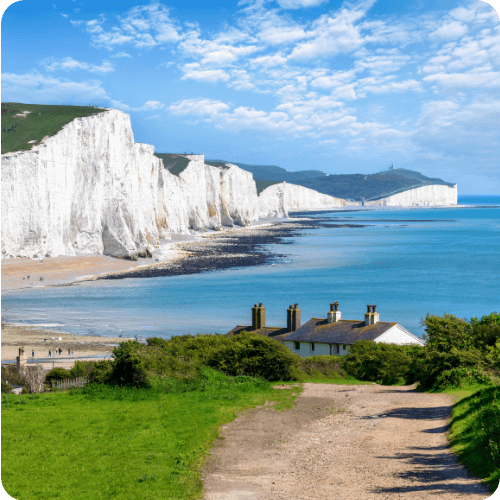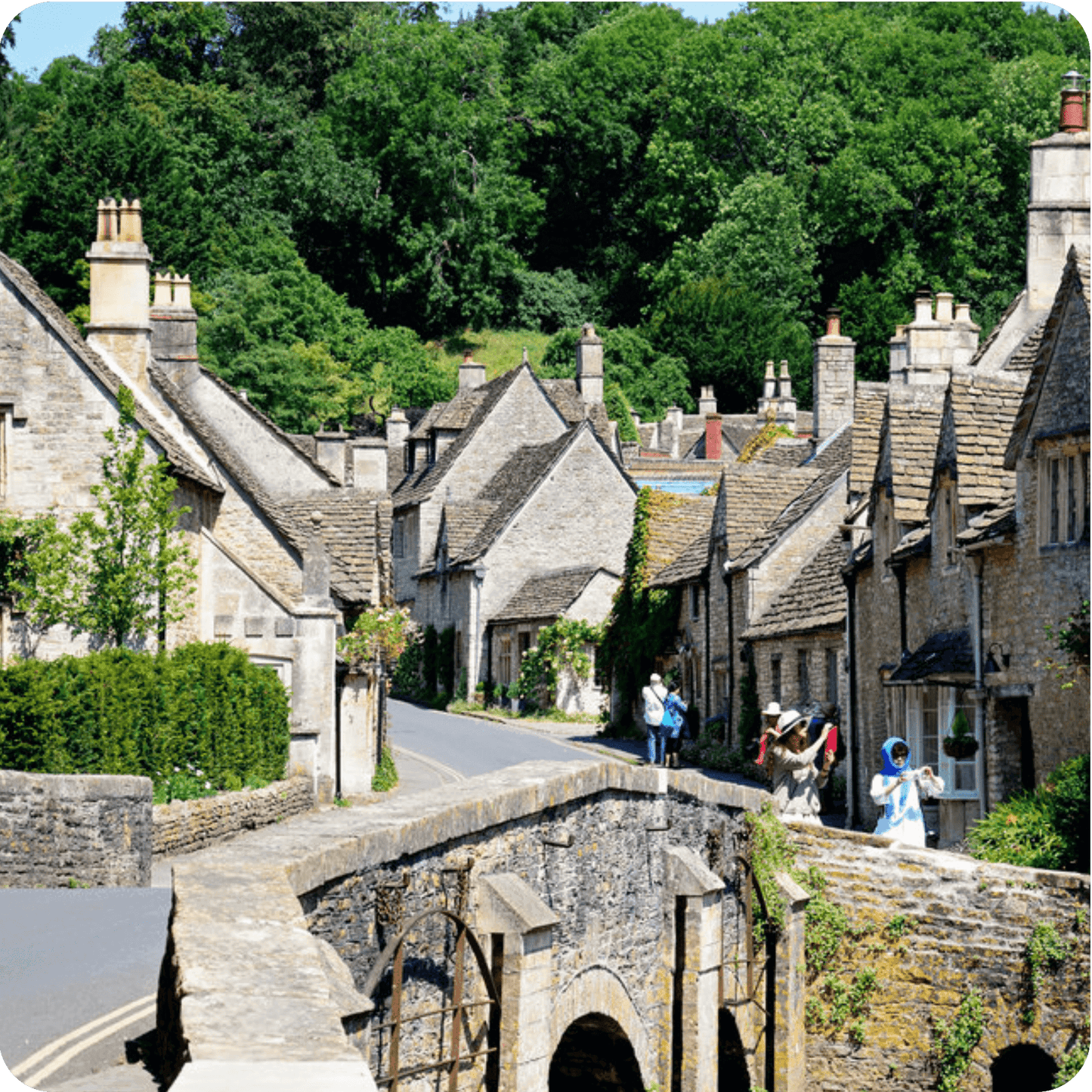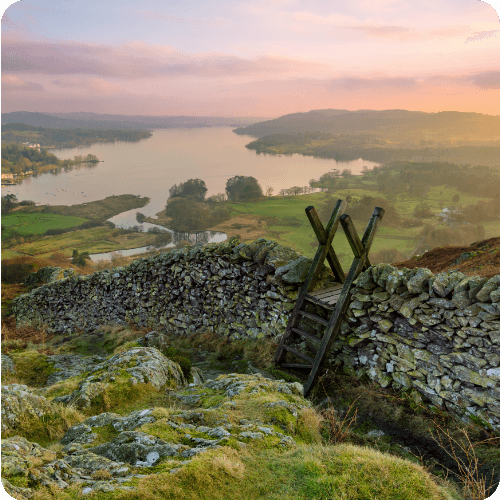Get the best price by using the promo code GO25 at checkout (day tours only)`

Croeso! During our time in Wales we'll visit vibrant cities, seaside towns and rural heartlands steeped in culture & legend. This is a journey through ancient history, stunning landscapes and the rich cultural of Wales and its people.
MONDAY
For those joining from London, your tour departs from Holiday Inn London - Kensington High Street.
Check-in at 8.15am (Depart by 8.30am).
Our tour to Wales begins by departing London and on our way to Wales we’ll stop in at the charming village of Castle Combe, arguably the most picture-perfect village in the Cotswolds. Here we can wander around the quiet streets and admire the villages’ idyllic river setting. After a short stop it won’t be long before we’re crossing over the Severn Bridge and entering Wales. Our first stop is Chepstow Castle; the oldest castle in a country that is known as the ‘castle capital of the world’. Set on the cliffs above the River Wye, Chepstow Castle dates back to the year 1067 and given the castle is only a short distance from England, this was one of the most important fortresses in Wales. Take time to visit the castle and have lunch. Next, we’ll pass by the iconic ruins of Tintern Abbey on our way towards Cardiff Bay; formerly the city docklands and once the largest coal-trading port in the world. Now regenerated, it is home to the Welsh parliament, the Millenium Centre, an international sports village and the BBC’s home of Doctor Who. Then we’ll travel the short distance to the city centre and we’ll spend the first night of our Wales tour in Cardiff; the cosmopolitan capital city.
OVERNIGHT: Cardiff
TUESDAY
For those joining from Cardiff, your tour departs from Premier Inn Cardiff City Centre (Queen Street) Hotel.
Check-in at 8.15am (Depart by 8.30am).
This morning we’ll depart Cardiff city centre and travel north to Big Pit National Coal Museum. ‘Big Pit’ is a celebration of the coal industry in South Wales and one of the leading mining museums in Britain. There’s a lot to see and do here, and we’ll have ample time to take-in the exhibitions, which tell the the history of Wales’ industrial past. There will also be the option to take an underground tour into one of the actual mines. Next, absorb the beautiful scenery as we journey across Brecon Beacons National Park, with the Black mountains to the east, as we make our way to the traditional market town of Brecon, where we’ll stop for lunch. This afternoon we continue north through the heart of Wales towards the Elan Valley, an area of spectacular landscapes and Victorian engineering. We’ll stop in at the isolated visitor centre and enjoy a terrain that is defined by magnificent dams and beautiful wilderness, showing off Wales at its best. Then we’ll continue through the Cambrian hills, before descending into the picturesque seaside town of Aberystwyth; the ‘capital’ of Welsh-speaking Wales, where we will spend the next two nights.
OVERNIGHT: Aberystwyth
WEDNESDAY
Today we’ll absorb the history and beauty of Snowdonia National Park; home to some of the most stunning scenery in Britain. This morning we travel north through the Welsh countryside and it won’t be long before we cross into Snowdonia itself. Covering 823 square miles, this is Wales’ largest National Park, home to mountains, valleys and charming villages. It is an area that provides the sights and sounds of ‘real’ Wales; more than half of the local population in this region speak Welsh. We’ll spend the day travelling through the heart of the Snowdonia, with a number of photo-stops along the way, including the short journey to the coast, where we’ll take in Harlech Castle. This is one part of King Edward I’s ring of magnificent 13th century medieval fortresses around North Wales. Here we’ll have time to visit the castle and have some lunch. By late-afternoon we’ll return to Aberystwyth with time to explore the seaside town; take a stroll along the sea-front and the Victorian promenade. We’ll spend a second night in Aberystwyth.
OVERNIGHT: Aberystwyth
THURSDAY
Our Welsh adventure continues and today we’ll explore the south-westernmost corner of Wales. Departing Aberystwyth we’ll begin by travelling along the coast towards the tiny harbour town of New Quay. With its multi-coloured cottages and sandy beaches, the town has connections with Dylan Thomas; probably Wales’ most famous 20th century poet, and from the quay here you can often spot pods of Dolphins. Next, we continue south, passing the Presili Hills into Pembrokeshire Coast National Park, before arriving into Britain’s smallest city; St Davids. Despite its size, the city is home to a magnificent cathedral, sited next to the Bishop’s Palace which was founded by Wales’ patron saint, St David. Inside the cathedral are the tombs of many influential medieval knights, as well as a shrine to St David himself. Departing the city we’ll pass Pembroke; a town dominated by one of the largest and most important castles in Anglo-Welsh history, as we make the short journey to the popular seaside town of Tenby. We’ll arrive by mid-afternoon with the rest of the day free to explore the charming harbour and sea-front. This is where we’ll spend the final night of the tour.
OVERNIGHT: Tenby
FRIDAY
The final day of our Wales tour from London begins by departing Tenby and travelling to St Fagans National Museum of History, a fantastic, free open-air museum which captures a huge range of Welsh history in one place. We’ll have plenty of time here, as there is much to do and see. Set in 100-acres of parkland in the grounds of St Fagans Castle, there are more than fifty original re-constructed buildings from across Wales, showing different periods of Welsh architecture. There are also beautiful gardens, native breeds of livestock in the fields, workshops where craftsmen demonstrate traditional skills and much more. After ample time at St Fagans, we’ll make the short journey back to Cardiff where the tour will end for those who joined from Cardiff at Premier Inn Cardiff City Centre by approximately 2.00pm.
We’ll then make the journey back towards the borderlands and into England, where our Wales tour concludes. The Best of Wales tour ends at The Holiday Inn Hotel, London by approximately 6:00pm.
Enter photo competition
Tag us in your photos @gotoursuk to enter our photo competition! Each season we'll select a winner.
How did we do?
We greatly appreciate it if you can leave your feedback at the end of the tour. It means so much to us as a small and independent company. Make sure to mention your driver-guide's name!
10 useful words to learn
1. elo / S'mae (or Shwmae)
Pronunciation:
Helo (Hello): Same as English!
S'mae (North Wales): 'ss-MY'
Shwmae (South Wales): 'SHOO-my'
Meaning: Hello / How's it going?
Why it's useful: A friendly and common greeting. Using S'mae or Shwmae is a great way to start a conversation with locals and will definitely earn you a smile.
2. Diolch
Pronunciation: 'DEE-olch' (the 'ch' is a soft sound from the back of your throat, like in the Scottish word 'loch').
Meaning: Thank you.
Why it's useful: This is probably the most important word to learn. Politeness is universal. For extra points, you can say $Diolch yn fawr$ ('DEE-olch un VOW-r'), which means 'Thank you very much'.
3. Os gwelwch yn dda
Pronunciation: 'oss GWEL-ooch un DAH'.
Meaning: Please.
Why it's useful: Another essential for being polite when ordering food, buying tickets, or asking for help.
4. Ie / Nage
Pronunciation:
Ie (Yes): 'YEH'
Nage (No): 'NA-geh'
Meaning: Yes / No.
Why it's useful: The absolute basics for answering simple questions.
5. Hwyl
Pronunciation: 'HOO-eel'.
Meaning: Bye!
Why it's useful: A short, sweet, and very common way to say goodbye. It can also mean 'fun', so you're wishing someone fun as they go!
6. Iechyd da!
Pronunciation: 'YEH-kid DAH!'
Meaning: Cheers! / Good health!
Why it's useful: Perfect for when you're enjoying a drink in a pub. It’s the Welsh equivalent of raising your glass for a toast.
7. Coffi / Te
Pronunciation:
Coffi (Coffee): 'COFF-ee'
Te (Tea): 'TAY'
Meaning: Coffee / Tea.
Why it's useful: Essential for getting your morning caffeine fix in any Welsh café.
8. Tŷ bach
Pronunciation: 'TEE bach' (again, with the 'ch' from 'loch').
Meaning: Toilet / Loo.
Why it's useful: Literally translates to "little house," this is a quaint and common term for the toilet. A very practical phrase to know!
9. Hyfryd
Pronunciation: 'HUV-rid'.
Meaning: Lovely / Wonderful.
Why it's useful: A great word to use when commenting on the beautiful Welsh scenery, the food, or just about anything you're enjoying.
10. Cymru
Pronunciation: 'KUM-ree'.
Meaning: Wales.
Why it's useful: Knowing the name of the country in its own language shows respect and interest. You'll see $Cymru$ written everywhere, from road signs to food packaging.
Have a fantastic trip! People will really appreciate you making the effort. (Enjoy your trip!)


